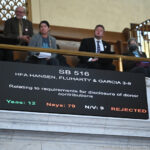- Like
- Digg
- Del
- Tumblr
- VKontakte
- Buffer
- Love This
- Odnoklassniki
- Meneame
- Blogger
- Amazon
- Yahoo Mail
- Gmail
- AOL
- Newsvine
- HackerNews
- Evernote
- MySpace
- Mail.ru
- Viadeo
- Line
- Comments
- Yummly
- SMS
- Viber
- Telegram
- Subscribe
- Skype
- Facebook Messenger
- Kakao
- LiveJournal
- Yammer
- Edgar
- Fintel
- Mix
- Instapaper
- Copy Link
Legislature Votes to Decrease Transparency of Political Spending in WV
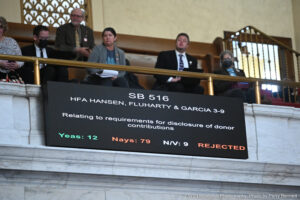 Of the nine election bills passed by the Senate, three were taken up and passed by the House during the final week of the session. Unfortunately, two of these would decrease transparency of political spending in West Virginia. Ahead of the final vote on these measures, Delegates Evan Hansen, Joey Garcia and Shawn Fluharty offered an amendment to SB 516 that would close loopholes in the state’s election laws that allow groups that spend money to influence elections to hide the identity of their donors. The amendment drew the support of only two Republicans, and was defeated in a 12-79 vote.
Of the nine election bills passed by the Senate, three were taken up and passed by the House during the final week of the session. Unfortunately, two of these would decrease transparency of political spending in West Virginia. Ahead of the final vote on these measures, Delegates Evan Hansen, Joey Garcia and Shawn Fluharty offered an amendment to SB 516 that would close loopholes in the state’s election laws that allow groups that spend money to influence elections to hide the identity of their donors. The amendment drew the support of only two Republicans, and was defeated in a 12-79 vote.
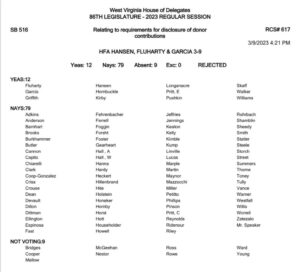 Twelve Republicans joined their Democratic colleagues to vote against the bill the following day, but that was not enough to defeat the bill, which raises the reporting and donor disclosure thresholds for entities that spend money on independent expenditures and electioneering communications during an election. In both instances, the threshold that would require the disclosure of donors who contribute toward these types of expenditures is being raised from $250 to $1,000. It also introduces a loophole for reporting of electioneering communications, that will make it easier for groups to spend money on political ads without revealing where they got the money to pay for them.
Twelve Republicans joined their Democratic colleagues to vote against the bill the following day, but that was not enough to defeat the bill, which raises the reporting and donor disclosure thresholds for entities that spend money on independent expenditures and electioneering communications during an election. In both instances, the threshold that would require the disclosure of donors who contribute toward these types of expenditures is being raised from $250 to $1,000. It also introduces a loophole for reporting of electioneering communications, that will make it easier for groups to spend money on political ads without revealing where they got the money to pay for them.
Just prior to the vote on SB 516, delegates defeated another bill to raise the spending limits that require individuals and organizations to file disclosures with the state Ethics Commission regarding grassroots lobbying campaigns. Grassroots lobbying is when groups or individuals spend money on advertising or other communications to urge members 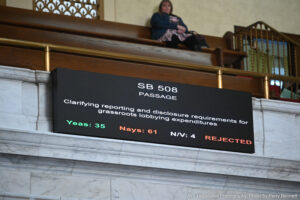 of the public to contact the Legislature in order to influence how they will vote on legislation under consideration. However, after initially defeating SB 508 in a 35-61 vote, delegates voted to reconsider the bill and ultimately passed it, 49-41. Although the supporters for loosening the reporting requirements portrayed grassroots lobbying as an activity largely taken up by average citizens, both Mountain State Spotlight and the Charleston Gazette-Mail reported that the largest grassroots lobbying organization in the state is Americans for Prosperity, the conservative advocacy group funded by the notorious Koch Brothers.
of the public to contact the Legislature in order to influence how they will vote on legislation under consideration. However, after initially defeating SB 508 in a 35-61 vote, delegates voted to reconsider the bill and ultimately passed it, 49-41. Although the supporters for loosening the reporting requirements portrayed grassroots lobbying as an activity largely taken up by average citizens, both Mountain State Spotlight and the Charleston Gazette-Mail reported that the largest grassroots lobbying organization in the state is Americans for Prosperity, the conservative advocacy group funded by the notorious Koch Brothers.
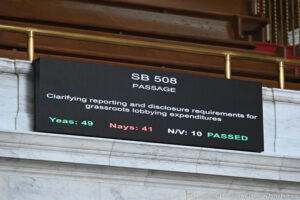 The only other election bill to cross the legislative finish line is SB 631, which facilitates the state’s use of federal money for the purchase of election equipment or security upgrades, including upgrades to physical infrastructure and cyber security, that further the administration of elections held in the state. The bill was amended to include the provisions of SB 234 to set a uniform statewide deadline of 11:59 p.m. on the final day of registration for online voter registrations, rather than the “close of business”, which varies from county to county.
The only other election bill to cross the legislative finish line is SB 631, which facilitates the state’s use of federal money for the purchase of election equipment or security upgrades, including upgrades to physical infrastructure and cyber security, that further the administration of elections held in the state. The bill was amended to include the provisions of SB 234 to set a uniform statewide deadline of 11:59 p.m. on the final day of registration for online voter registrations, rather than the “close of business”, which varies from county to county.
WV is Among GOP States to Leave Key Voting Data Partnership
Speaking of voter registration, we were surprised to learn last week that Secretary of State Mac Warner has made the decision to pull West Virginia out of the Electronic Registration Information Center. More commonly known as ERIC, this bipartisan data sharing collaborative formed by state election officials to help keep voter rolls up to date, which has been touted by Republicans as “one of the best fraud-fighting tools that we have,” is under attack by right-wing conspiracy theorists and election deniers. Warner cited partisan influences in ERIC’s governance as a reason for the withdrawal, but his decision for the move appears to be nothing more than a thinly veiled attempt to appease supporters of former President Donald Trump who continue to believe the Big Lie that the 2020 election was stolen. Warner said the state will “take the necessary steps to supplement state list-maintenance data sources that ERIC had facilitated.” However, election officials and experts across the political spectrum say that would be nearly impossible, or would cost an exorbitant amount of time and money. Warner is the one playing politics, allowing disinformation to get in the way of best practices at West Virginia voters’ and taxpayers’ expense.
Bill to Cap Compensation for “Deliberate Intent” Heads to Governor; Attempt to Reform “Public Nuisance” Dies in House
A bill (HB 3270) that would cap how much workers or their families can recover as compensation for noneconomic losses when an employer ignores safety hazards that lead to severe injury or death is headed to the Governor. The version of the bill that passed the House late last month was viewed as a compromise by some lawmakers and advocates, but incensed others, especially those who represent former coal miners with black lung and attorneys who represent miners and their families. Mountain State Spotlight has more on the timber company with a spotty safety record that has been one of the most outspoken proponents of limiting payouts in lawsuits brought under the state’s “deliberate intent” statute.
Meanwhile, an attempt to reform the state’s “public nuisance” laws that West Virginia counties and municipalities have used to bring suit against the pharmaceutical companies that have fueled the opioid crisis, passed the Senate just ahead Crossover Day, but was voted down by the House Judiciary Committee. SB 547 would have limited remedies available to local governments and state agencies and prevented them from recovering economic and other damages related to costs they have incurred responding to the crisis, in addition to putting limitations on the standing and rights of private citizens to file nuisance suits.
Judicial Redistricting Passes on Day 60
Finally, a bill to modify the number and allocation of circuit court judges, family court judges, and magistrates to be elected in the 2024 general election, and to provide for additional support staff in our family courts and magistrate courts passed after bouncing back and forth between the House and the Senate on the final day to make technical corrections. HB 3332 reconfigures the state’s judicial circuits based on census data, as well as a series of caseload and needs assessment studies prepared by the National Center for State Courts.
There are currently 159 magistrates statewide, with at least two in every county and ten in the largest county, Kanawha. HB 3332 creates 10 new magistrate positions across the state (3 in Kanawha County; 2 in Monongalia County; and 1 each in Berkeley, Logan, Raleigh, Jefferson, and Wood counties). At the family court level, there are forty-seven family court judges who serve twenty-seven family court circuits. One new family court judge is being added to the circuit serving Berkeley and Jefferson counties to help address a backlog of abuse and neglect cases.
The biggest changes pertain to the circuit courts. HB 3332 eliminates all of the current single judge circuits with the exception of the circuit that includes Monroe and Summers counties. This will make it easier for another judge to step in if a judge is disqualified from hearing a case due to a conflict of interest. Some circuits are divided into geographic divisions in order to keep all the judges in a circuit from being from the same county. The other big changes it that beginning with the judicial elections held in 2024, if no candidate in a division for judge of a circuit court receives more than 30 percent of the votes cast in the election, there will be a runoff election will be held during the general election between the two candidates who received the highest and next-highest number of votes cast in that division.
ICYMI: In February, the WV Legislature Today spoke with Beth Walker, Chief Justice of the WV Supreme Court of Appeals, and the chairs of the Senate and House Judiciary Committees to learn more about the process. Watch or listen here (the segment on judicial redistricting begins just past the 9:30 mark).The WV Courts website also has caseload studies and more on the various courts that are part of our state’s judicial system.


